Joint supplements are a way to slow down or possibly even reverse the damage and pain caused by degenerative changes in your joints as you get older.
Typically, an effective joint supplement will include glucosamine, chondroitin, and methylsulfonylmethane (better known as MSM).
Each of these ingredients are thought to help with a variety of joint-related functions, like helping your cartilage retain more water, increase the rate of collagen synthesis in your joints, and fight inflammation.
There are a dizzying number of joint supplements out there (and fish oil, krill oil and zinc can help joint health, too) and not all of them have the ingredients you need. We’ve looked at what’s on the market and ranked the ten best joint supplements.
1. Schiff Move Free Joint Health
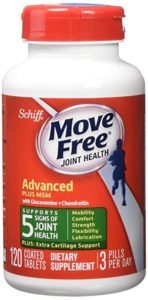
Click here for the lowest price on Amazon
Providing a strong dose of all four major joint supplement compounds, Schiff Move Free is the standard-bearer when it comes to mainstream joint health supplements.
Each tablet contains 500 mg of glucosamine, which is matched with 500 mg of MSM alongside chondroitin and hyaluronic acid. For a joint supplement that most closely approximates what is being used in clinical trials to treat osteoarthritis-related joint pain, Schiff Move Free should be your choice.
2. Zenwise Advanced Strength Joint Support
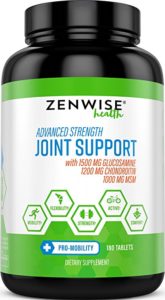
Click here for the lowest price on Amazon
Zenwise makes an excellent joint supplement that covers all of your bases. With regards to glucosamine, the most widely-studied joint supplement, each tablet provides 500 mg, alongside chondroitin, MSM and hyaluronic acid, which are considered the mainstay ingredients in joint supplements.
For fans of herbal remedies, it also includes boswellia and curcumin, which is derived from turmeric. Both of these are anti-inflammatory extracts that may be able to relieve joint pain in the short term.
3. Vimerson Health Glucosamine Chondroitin Turmeric MSM & Boswellia
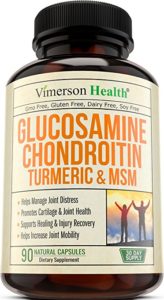
Click here for the lowest price on Amazon
This joint supplement from Vimerson Health has many of the ingredients you’ll see in other joint supplements, but it adds in quercetin, methionine, and bromelain, three uncommon ingredients that are not as well-researched.
If a standard joint supplement is failing you, it might be worth a shot to try Vimerson Health’s version, because these extras might do the trick for you. For people just looking for a solid source of glucosamine, chondroitin, and MSM, it’s pretty good too.
4. BioScience Nutrition Joint Support
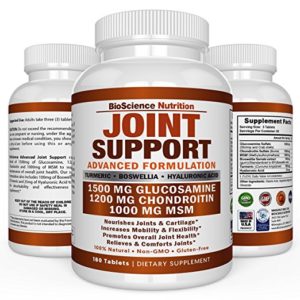
Click here for the lowest price on Amazon
BioScience Nutrition has a pretty solid joint supplement that’s got all the usual suspects. The ratio of glucosamine to chondroitin is a little greater than some of the very best supplements, and it doesn’t have any unusual or interesting ingredients, but it’s still a solid joint support supplement with a strong dosage.
5. Universal Nutrition Animal Flex
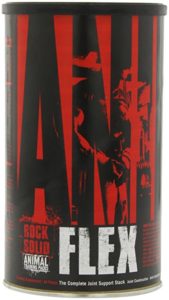
Click here for the lowest price on Amazon
Animal Flex is unique in that it comes in individual packs of tablets that provide a range of nutrients related to joint function. Universal Nutrition takes wide aim, providing vitamin C, vitamin E, zinc, selenium, and manganese, alongside traditional joint supplements like glucosamine and chondroitin.
The wide range of compounds in the supplements might help with recalcitrant cases of joint pain that are not responding to a more standard joint supplement. If you don’t need all the extras, though, there are other supplements that don’t take the firehose approach.
6. Prime Labs Ultra Joint Flex
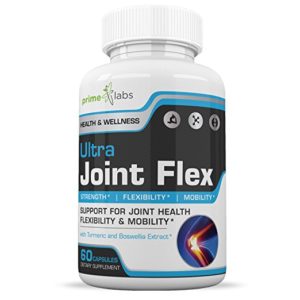
Click here for the lowest price on Amazon
Prime Labs Ultra Joint Flex is a high dosage joint supplement that’s very straightforward in its design. It’s based on the same mix of glucosamine, chondroitin, and MSM you’ll find in other supplements, along with quercetin, methionine, boswellia, and bromelain, secondary ingredients which are becoming increasingly popular.
Fans of hyaluronic acid will be disappointed, though, because Prime Labs chose not to include that in the supplement. The levels of chondroitin are also not as high as they are in other joint supplements.
7. Doctor’s Best Glucosamine Chondroitin MSM
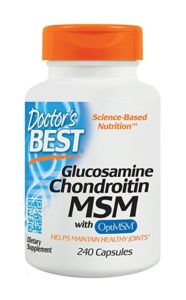
Click here for the lowest price on Amazon
Doctor’s Best checks most of the right boxes with regards to ingredients–it’s got glucosamine, MSM, and chondroitin–but falls short on dosage.
There’s less than 400 mg of glucosamine per tablet, and the amount of MSM substantially less than that. On top of that, the recommended serving size is a whopping four tablets. The formulation is solid, but with so many better options out there, Doctor’s best can’t exactly compete.
8. New Chapter Zyflamend Joint Supplement
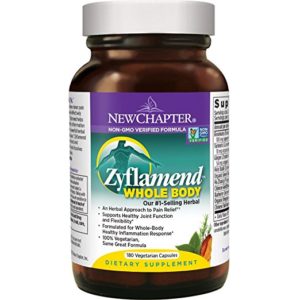
Click here for the lowest price on Amazon
New Chapter’s Zyflamend takes a decidedly different tack. It’s more of an herbal supplement, with no less than ten different herbal extracts. Some, like green tea and turmeric, are familiar, while others are quite obscure.
It almost goes without saying that most of these ingredients don’t have solid clinical evidence behind their usage, so most people should stick with a joint supplement that includes clinically validated ingredients like glucosamine.
However, if glucosamine-based joint supplements are not helping your joint pain, you could try New Chapter Zyflamend to see if it has any effect.
9. Garden of Life Wobenzym N Joint Health
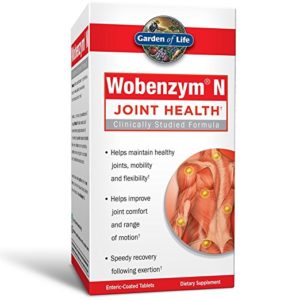
Click here for the lowest price on Amazon
As with many of Garden of Life’s products, their joint supplement is substantially different in formulation from anything else out there. Garden of Life provides a mixture of enzymes from a variety of plants which they claim are formulated to improve your joint function.
This, however, is not supported by independent scientific research, so given that there is plenty of evidence that compounds like glucosamine and chondroitin can improve joint health, Garden of Life should not be your first choice. Stick with what is known to be effective, at least for starters.
10. U.S. Doctors’ Clinical Arthro-7
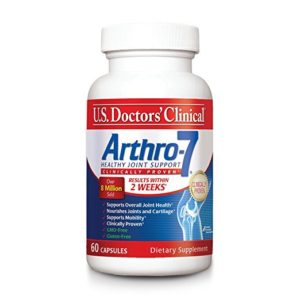
Click here for the lowest price on Amazon
Arthro-7 is a joint supplement that provides a mixture of compounds intended to improve joint health, but it’s lacking in substance.
For instance, it does not include chondroitin, one of the basic ingredients for the most effective joint health supplements. Further, its active ingredients are mixed into a “proprietary blend” that obscures the actual amount of each ingredient, so it’s impossible to tell how much glucosamine you are getting, or any other ingredient for that matter.
While it’s been favorably reviewed, there are much better alternatives on the market.
Joint supplement benefits and side effects
Joint supplements are formulated to fight the inflammation and the chronic degeneration that accompanies joint pain. The most common source of joint pain is arthritis, in which damage and inflammation cause a loss of joint cartilage and increasingly painful and restricted motion.
Because arthritis affects so many people, joint supplements–usually based on cartilage-reinforcing compounds like glucosamine and chondroitin–have been heavily researched for their ability to improve joint function, reduce pain, and potentially even slow down joint damage.
Benefits
As a result of their wide popularity, joint supplements are some of the best-studied category of health supplements. The types of formulations investigated are usually those based around glucosamine, chondroitin, and MSM, as these are all compounds that have a close biological link with the cartilage that makes up your joints.
Principally, glucosamine-based joint supplements are studied for their benefits related to arthritis, since it is such a public health burden.
However, it’s quite likely that many of the benefits of joint supplement extend to other joint pain related conditions, because the same kind of damage to cartilage and inflammation that is involved with arthritis is linked to other causes of joint pain as well.
In the case of arthritis, joint supplements appear to be effective at both reducing pain and slowing or halting the narrowing of the joint space that is caused by arthritis’ progressive degenerative damage to cartilage.
In 2006, the well-known New England Journal of Medicine published a clinical trial of glucosamine, chondroitin, and the combination of both together in the treatment of knee osteoarthritis (1).
The authors found that the best outcome in terms of pain reduction came when the glucosamine and chondroitin were used in combination, at a dosage ratio of 500 mg of glucosamine to 400 mg chondroitin. This suggests that the two supplements work in combination better than alone to decrease inflammation and joint pain.
A review article by Chad Deal and Roland Moskowitz in the journal Rheumatoid Disease Clinics of North America discusses how chondroitin and glucosamine work together to help reduce pain and slow the progress of joint space narrowing in arthritis patients (2).
The biological mechanism are complex, but the important part is that they do reflect a biologically plausible means by which a joint supplement can actually help improve the functioning of your joint.
The study found that a combination of glucosamine, chondroitin, and quercetin was more effective than a placebo when it comes to reducing the pain related to knee osteoarthritis.
It still hasn’t been demonstrated that quercetin pushes the benefit of a glucosamine/chondroitin supplement beyond its normal level, but still, these initial results are promising.
Glucosamine and chondroitin also appear to be effective at slowing the pace of joint space narrowing–a classic sign of the progression of arthritis.
This was the conclusion of a review article published in the Journal of the American Medical Association Internal Medicine which included a large range of smaller studies published since 1980 (3). Glucosamine in particular had a “highly significant” effect on the narrowing of the joint space in arthritis; i.e. it significantly slowed the rate of joint space narrowing.
Chondroitin, while effective at improving pain and joint function, did not have an effect on joint space narrowing. This suggests that any joint supplement you get should definitely include glucosamine to slow down the root problem in arthritis, the destruction of the cartilage between your bones. It is this process that leads to narrowed joint space and ultimately to greater arthritis pain and activity limitations.
Side effects
Large clinical trials have established that joint supplements based on glucosamine and chondroitin are very well-tolerated; the risk of side effects in a joint supplement based on these supplements is exactly the same as the risk of “side effects” from taking a placebo.
Even in people with seafood allergies, glucosamine (which is derived from shrimp) does not contain clinically relevant levels of the allergen that causes the allergy, so they are safe even with a seafood allergy (4).
One case report describes a patient whose asthma was believed to be aggravated by a glucosamine supplement, but aside from this single report, establishing this as a significant cause of side effects is difficult to do (5).
After all, asthma is quite common, and the clinical trials of glucosamine should have uncovered any potentially harmful association.
If you are taking a joint supplement that is based on some of the rarer, less well-studied herbal extracts and ingredients, you may be running a higher risk of side effects. These substances have not been tested in large clinical trials, so their potential for adverse effects remain unknown.
In addition to glucosamine and chondroitin, many joint supplements are starting to include additional compounds that have shown promise when it comes to mending joint pain.
One study published in 2011 in the Journal of the Science of Food and Agriculture examined quercetin, a plant-derived compound that may be useful as an antioxidant and anti-inflammatory when treating joint pain (6).
Recommended dosage
Typical large clinical trials of joint supplements that have found success have used dosages of approximately 500 to 1000 mg of glucosamine and nearly as much chondroitin.
The study mentioned earlier in the New England Journal of Medicine found good results when glucosamine and chondroitin were combined at nearly equal ratios (their study used a 5:4 ratio), and given that the combination of both got better results than glucosamine or chondroitin alone, it suggests that any joint supplement that you use should have both glucosamine and chondroitin at dosage levels that are at least roughly the same.
Recap
Joint supplements show a good deal of promise when it comes to reducing joint pain and slowing the progress of arthritis, and may well work even better for lesser joint problems.
The magnitude of improvement is not miraculous, though, so don’t expect a complete reversal of your joint problems. Rather, they can help get you more active and back to enjoying the lifestyle you want to live. As for dosage, shoot for a glucosamine content of 500-1000 mg, and nearly as much chondroitin, if possible.
As for the content of MSM, quercetin, and other compounds that are emerging as potentially useful ingredients in a joint supplement, the research is less clear, but they do appear to hold some promise, so it’s worth trying a joint supplement that has these extras.
https://bodynutrition.org/joint-supplements/
No comments:
Post a Comment